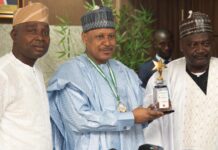The Nigerian Government has signed a Memorandum of Understanding (MoU) with neighbouring Cameroon to collaborate in the fight against Trans-border Wldlife Trade and to Promote Ecosystem Conservation and Management of Forestry and Wildlife Resources for sustainability.
The agreement was signed in Abuja recently by the Nigerian Minister of Environment, Balarabe Abbas Lawal and Cameroonian Minister of Forestry and Wildlife, Jules Doret Ndongo.
Balarabe during the signing of the MoU (Cooperation Framework Agreement on Trans boundary Ecosystem Conservation and Sustainable Management of Forestry and Wildlife Resources), stressed that the agreement symbolizes a milestone and would provides a platform for the establishment of a joint trans-boundary management framework in the interest of both countries.
Balarabe explained further that; “Apart from the global phenomenon of climate change and environmental challenges, social factors including over-population, poverty, food insecurity have continued to immerse these resources to the brink of extinction.
He stressed that while this is going on, trans-boundary criminality such as illegal logging, poaching and wildlife trafficking have further aggravated the trend and seem to have vindicated the reverberating but appalling warning revealed in the landmark Inter-Governmental Science-Policy Platform on Biodiversity and Ecosystem Services (IPBES), 2019 Global Assessment Report that about one million species are threatened with extinction, and many within decades.
“With our common border spanning over 1,500 km, halting and reversing the unsavoury trend cannot be achieved by the political will and commitment in a country alone but more promising is the adoption of bilateral and multilateral approaches particularly when considering the continuum and migratory nature of these resources against the backdrop of the complexities of their trans-boundary management and conservation.
The Minister reiterated that: “To that extent, the event of today is of great significance as it does not only underscore the commitment of the Renewed Hope Agenda of the present Government to collaborate with Cameroon to manage and conserve our shared natural resources but also demonstrates the importance of bilateral cooperation in tackling global challenges. So, this agreement can be said to be galvanised by this long history and an apt response to international commitments undertaken by the parties.
“This agreement will further facilitate the development and implementation of joint programmes and projects for the conservation and sustainable management of trans-boundary ecosystems, and also foster the sharing of experiences, knowledge, and best practices between the Federal Republic of Nigeria and the Republic of Cameroon.”
The Minister said that the agreement symbolises a milestone and provides a platform for the establishment of a joint trans-boundary management framework, which will facilitate cooperation and coordination between the two countries on the conservation and sustainable use of our natural resources.
“This framework will be instrumental in ensuring the effective conservation and sustainable management of our forests and wildlife resources, which are critical to our ecosystem services, livelihoods, and sustainable development.
He pledged that Nigeria would play its part in ensuring the successful implementation of the agreement.
He also hailed the collaboration the country has with national and international partners like the German Government, the United States Agency for International Development, through United Nations Office on Drugs and Crime, the International Narcotics and Law Enforcement, the Food and Agriculture Organisation, the Wildlife Conservation Society, the TRAFFIC International, the Africa Nature Investors, and the Environmental Investigation Agency, among others.
Also speaking, Cameroonian Minister of Environment and Wildlife, Jules Ndongo said there is a great deal of trade between the two countries, especially those living on either side of a common border, and some of the transactions involve the exploitation and marketing of timber, non-timber forest products, and bush meat. He stated that it should be underscored that you cannot ascertain that all these activities are carried out legally.
According to Ndongo, the over-exploitation of forestry resources and poaching, especially cross-border poaching, are serious threats to the sustainable management of our natural resources and constitute one of the causes of climate change.
Given its importance, I hereby urge all parties involved in this process to be more committed in the implementation of this instrument, Ndongo added.
The Cameroun’s Minister assured that his country would do everything possible to implement the agreement.
Similarly, Ndongo further called on all technical and financial partners who assisted them from the beginning of this process to today’s successful conclusion not to stop at this juncture.
He added that, “After the signing of this agreement, our doors will remain widely opened to welcome interest partners on board. Our relevant technical services, assisted by our technical and financial partners, should now undertake the task of pursuing the agreement implementation process.”
Ndongo further assured that Cameroon would do everything possible to implement the agreement.
In his welcome address earlier, the Permanent Secretary, Federal Ministry of Environment, Alhaji Mahmud Kambari said the memorandum of Understanding signifies dedication to combatting deforestation, illegal poaching, habitat degradation, climate change, and other anthropogenic factors all of which threaten their shared natural heritage.
Kambari explained further that the implementation of the agreement aims to supervise and coordinate identified areas of cooperation, ensure special protocols are consistent with identified areas of cooperation, collaborate in the implementation of common trans-boundary programmes, and develop the institutional and mobilisation of funds for the implementation of common trans-boundary programmes.”
In his remarks, Head of Environment and Climate Change Division, Economic Community of West African States (ECOWAS), Bernard Koffi, represented by ECOWAS Advisor, Adewale Adeleke said, “This is one agreement ECOWAS has been looking forward to, we need to cooperate with each other, we need to share experiences and work together both legally and with communities to safe guard the resources of both countries.”
Danjuma Amodu
CIO
For:Head, Press and Public Relations Unit






